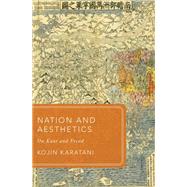Nation and Aesthetics On Kant and Freud
, by Karatani, Kojin; Abel, Jonathan E.; Yoshikuni, Hiroki; Tsen, Darwin H.- ISBN: 9780190622978 | 0190622970
- Cover: Hardcover
- Copyright: 6/19/2017
Nation and Aesthetics is a unique attempt to examine the ambiguous nature of nationalism and nation by examining them through aesthetics. In this translation by Jonathan E. Abel, Darwin H. Tsen, and Hiroki Yoshikuni, Karatani grasps the modern social formation as a nexus of three different "modes of exchange", namely capital-nation-state. Nation here plays the role of complementing capitalism and the state. Benedict Anderson defined nation as an "imagined community". Through rethinking Kant, Karatani suggests that "imagination" here is not a mere fancy, but very real, in the sense that it mediates state and capital. Usually imagination is regarded as fancying what is not present here. Kant grasped imagination as a faculty to imagine what we can understand but cannot sense; that is, to say, a faculty to mediate reason and sensibility. This observation provided the foundation to Modern aesthetics, which in the course of time became an important source of nationalism. In Italy, Germany, and Japan, nationalism appeared as fascism. They found in aesthetics a moment to go beyond capitalism and the state.
The key to go beyond nation, Karatani argues, lies also in the thoughts of Kant, a cosmopolitan and an advocate of a world republic. It is well-known that the League of Nations was formed after First World War under the influence of his "Perpetual Peace". Karatani draws attention to the overlooked fact that around the same time Freud made a radical revision of his notion of the "superego". Karatani introduces article nine of Japan's postwar constitution, which renounces the right to wage war, as a crystallization of Kant's ideal of peace and Freud's superego. By providing a unique explanation of, and ways to counter, current nationalistic and imperialistic tendencies, Nation and Aesthetics argues that theories of Kant and Freud, which are usually understood to contrast, are deeply linked and suggest ways to go beyond capital-nation-state.
The key to go beyond nation, Karatani argues, lies also in the thoughts of Kant, a cosmopolitan and an advocate of a world republic. It is well-known that the League of Nations was formed after First World War under the influence of his "Perpetual Peace". Karatani draws attention to the overlooked fact that around the same time Freud made a radical revision of his notion of the "superego". Karatani introduces article nine of Japan's postwar constitution, which renounces the right to wage war, as a crystallization of Kant's ideal of peace and Freud's superego. By providing a unique explanation of, and ways to counter, current nationalistic and imperialistic tendencies, Nation and Aesthetics argues that theories of Kant and Freud, which are usually understood to contrast, are deeply linked and suggest ways to go beyond capital-nation-state.







